Text
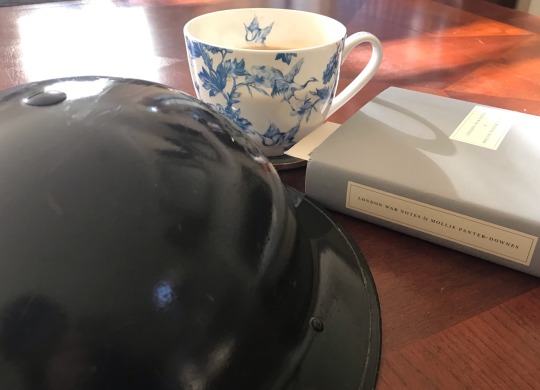
I’m prepared this morning to read more of London War Notes by Mollie Panter-Downes 1939-1945. I love the way she provides a personal sense of what is happening by focusing on a striking image or scene, sharing part of a conversation or an anecdote. It’s reportage but with an artist’s sensibility. Her wry humor is charmingly understated and uplifting.🇬🇧
To be continued…
An excerpt: “At somewhere round nine, Shepherd Parva spoke again, this time in the steady, reassuring tones of the all clear. Mugborne, we felt, had not behaved too badly. We had been calm but ready for anything. The only person who suffered from the experience was an elderly lady, living a good way out from the village, who had heard the air raid sirens but not the all clear. She and her old cook were fished out of the cellar by Miss Chubb two days later. They had sat there quite philosophically, cooking emergency rations on a Primus stove and thinking that this was a nice, restful sort of air raid. If it had not been for the milk boy, who found an accumulation of untouched bottles sitting on the doorstep and raised the alarm, they might be there still.“ 😁

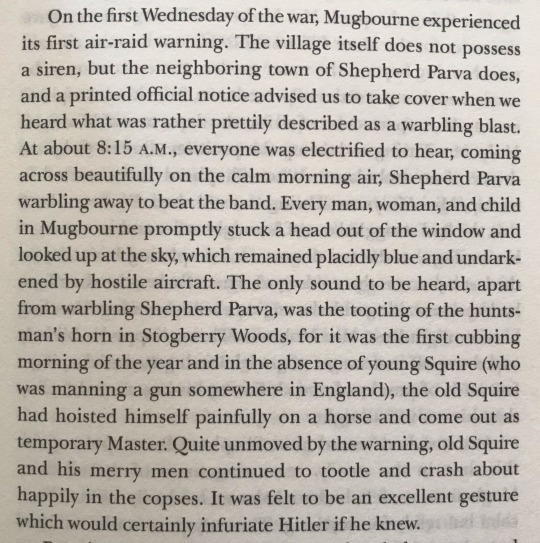
0 notes
Text
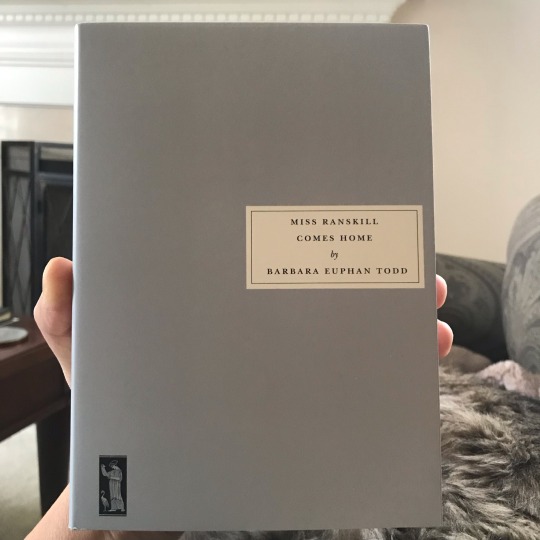

Miss Ranskill Comes Home published 1946 by Barbara Euphon Todd
Miss Ranskill returns to England after having been stranded on a desert island for three and a half years and finds her country and the world at war. Her homecoming isn’t what she expected. I enjoyed Miss Ranskill’s voice: her self deprecation, at times wry humor, and depth of feeling. The writing is remarkably vivid. Here’s an example: “It was better outside in the pale wavering sunlight. The wind, blowing inland, carried gallantry with it, ruffled the puddles to a mackerel shimmering, snatched the scents of a flower shop at the corner and made Miss Ranskill the swift present of them.” The author gives us a close look at the hardships and preoccupations of the home front, often satirically. I enjoyed how the author contrasts Miss Ranskill’s altered views on life’s priorities to those near her, so the story is in part allegorical. I won’t say anything more, but I recommend this unusual and moving story.
As an aside, Miss Ranskill’s experience as a castaway reminded me of an essay by Pico Iyer entitled Why We Travel. An excerpt: ”Yet for me the first great joy of traveling is simply the luxury of leaving all my beliefs and certainties at home, and seeing everything I thought I knew in a different light, and from a crooked angle… We travel, then, in part just to shake up our complacencies by seeing all the moral and political urgencies, the life and death dilemmas, that we seldom have to face at home.” In my experience the farther you travel from what you know and your comfort level, the more chance there is to question one’s life views.
0 notes
Text

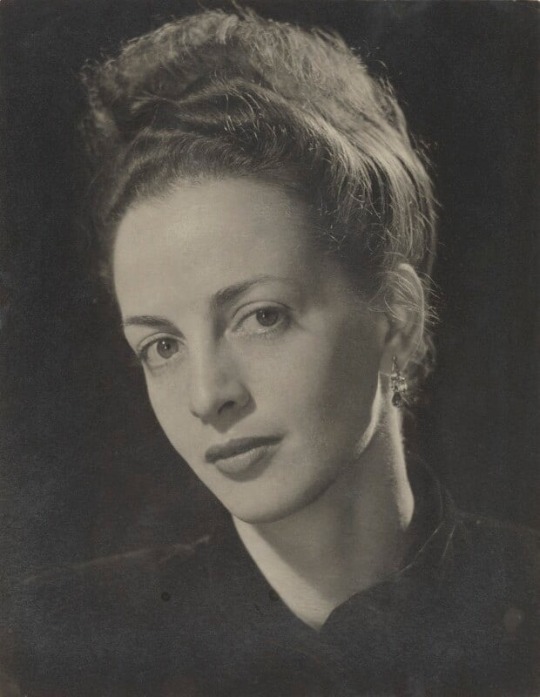
The Village published in 1952 by Marghanita Laski (October 24, 1915-February 6, 1988)
The novel describes Britain’s rapidly changing, increasingly egalitarian postwar society and its effect on a small village that had always known clearly defined class boundaries. I was impressed by Laski’s ability to present the different perspectives of village society in this period of transition. The story is compelling, the characters well drawn, and there are scenes that are quite moving. The Village is a novel of postwar Britain, but its themes of common humanity are universal. It’s a great novel imo and is now one of my all time favorites! I also enjoyed her earlier novel, Little Boy Lost. Why isn’t Marghanita Laski better known today?
2 notes
·
View notes
Text
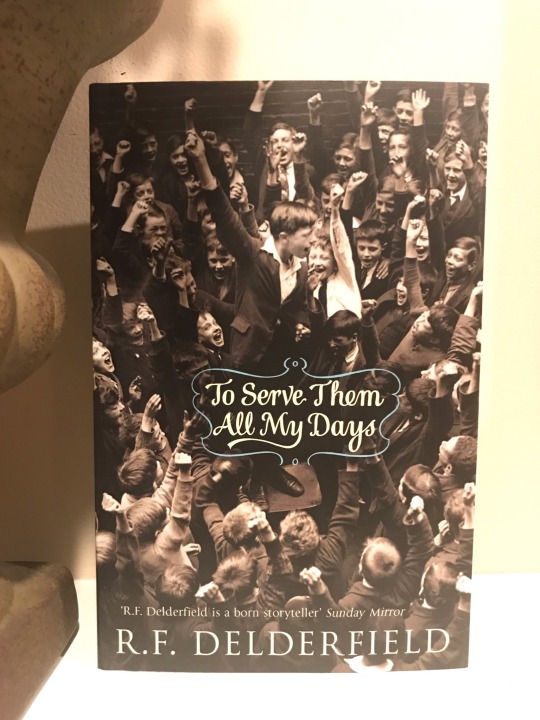
To Serve them All My Days by R.F. Delderfield, 1972. This is the story of 21 yo David Powlett-Jones who returns to England after having been nearly killed and badly shell shocked in Flanders. He meets a wise and compassionate headmaster at Bamfylde who helps David to start life anew as a teacher. Having attended schools like Bamfylde before the second world war, the author is able to realistically portray life in a boys public school and the sociopolitical issues of the time. It is also a moving testament to the kindness and devotion of educators and the legacies they bequeath that aren’t found in a syllabus - honor, duty, compassion, tradition. I will recall my time at Bamfylde with great fondness as if I were an Old Boy of the school.
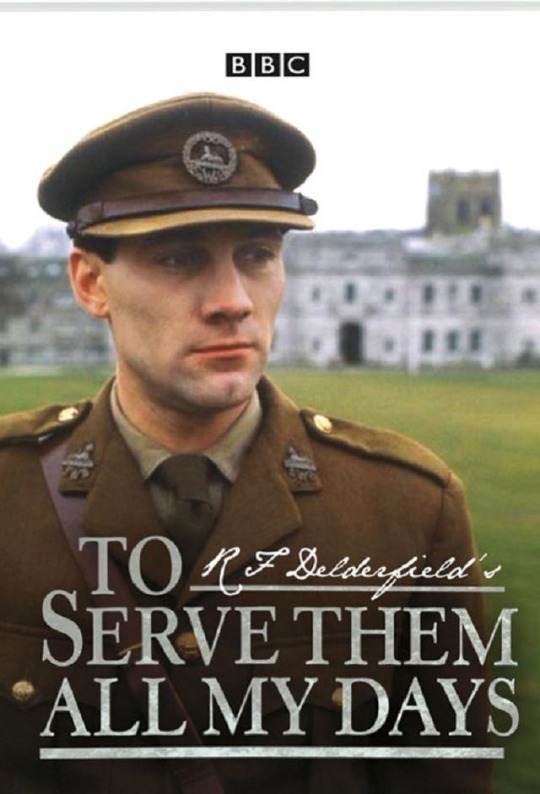
Looking forward to seeing the adaptation of the book.
1 note
·
View note
Text
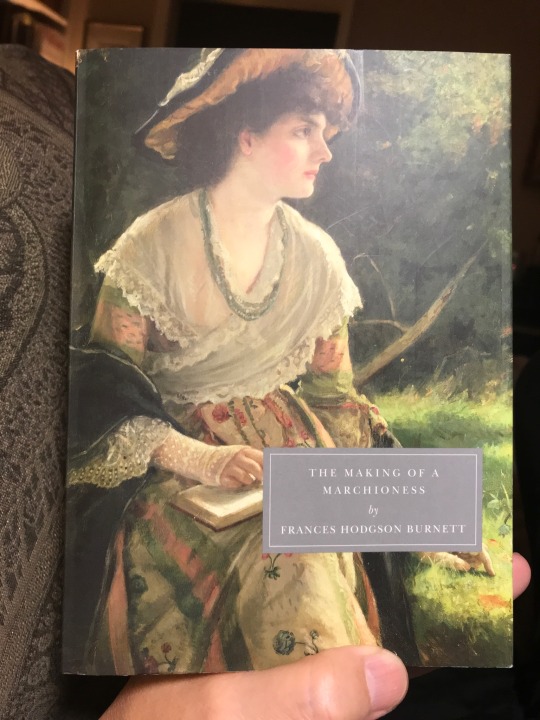
The Making of a Marchioness by Frances Hodgson Burnett, 1901. I enjoyed the story of Emily Fox-Seton, a poor but kind and cheerful woman of the gentry class. She is 34, without family or hopes of marriage, so she is thrifty and hard working and trying to extract as much happiness from her life as she can. She quickly gains the reader’s sympathy and interest. The story is dramatic and kept me anxiously wondering about her fate until the very end. The other characters and the detailed descriptions of place and fashion are also memorable. The story highlights the fearful difficulties that Victorian women faced: limited employment opportunities, the pressures of making a good marriage, the subservient role of women in marriage, marital abuse, and male preference inheritance law. I recommend it.
3 notes
·
View notes
Text
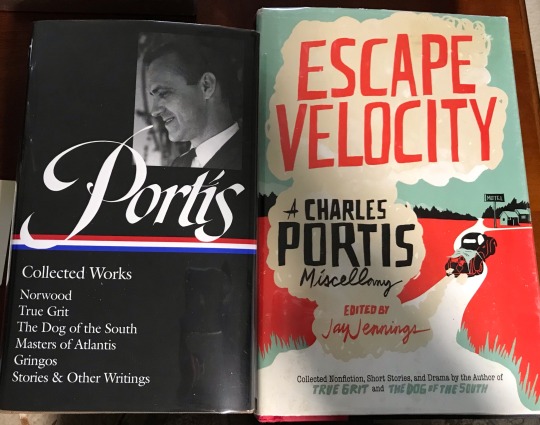
Charles Portis fans will be interested in Escape Velocity. Much of its content is in the Library of America collection. It also includes more journalism pieces, a play called Delray’s New Moon, an interview, and a section of tributes. It doesn’t contain the novels. Jay Jennings is also the editor of the LOA collection.
1 note
·
View note
Text

The Expendable Man by Dorothy B. Hughes, 1963
In the mystery/detective story genre, I’m far less keen on the tedious process of determining who dunnit or the magnitude of the horror than I am in the quality or uniqueness of the writing. In fact, I was impressed with the desert noir atmosphere and sense of dread. The factor of race adds a major complication to the story, and Hughes gives the reader a real sense of racism from the minority’s perspective.
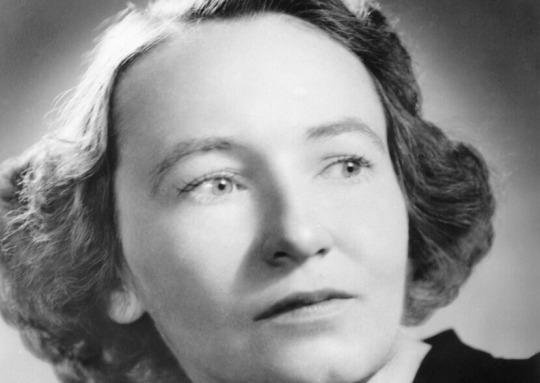
1 note
·
View note
Text
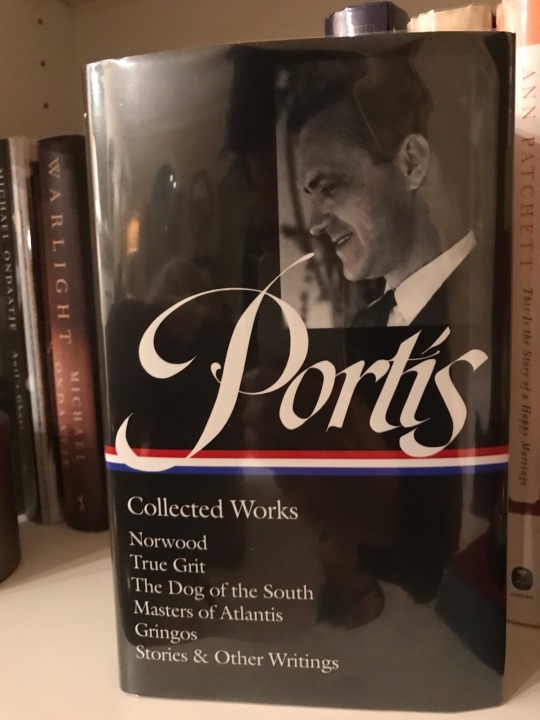
The Dog of the South by Charles Portis, 1979
Funny literature is uncommon in my experience, so I count myself very fortunate to have discovered this book. In fact, The Dog of the South is the funniest novel I have ever read! Your mileage may vary, but if for example you found The Secret Life of Walter Mitty starring Ben Stiller a riot, you’ll probably enjoy it! I’m gobsmacked by Portis’s prolific quirkiness. The humor never feels contrived because it’s inherent in the odd nature of the protagonist and narrator, Raymond Earl Midge. He’s a 26 yo underachiever from Arkansas who is on the trail of his unfaithful wife and her lover (ex-husband) who have stolen his credit cards, a shotgun, and car. He isn’t so torn up about his wife, but he wants his Gran Torino back. He uses the credit card receipts to track them through Texas and Mexico to Belize in a disintegrating ‘63 Buick Special. I loved Ray’s intelligence, eclectic fund of knowledge, and snarky attitude. His tangential asides, bits of superfluous interiority, and critical razor sharp observations are hilarious. He has an understanding of his limitations, is disappointed in what he has made of his life, yet he has a stubborn streak to do what he can with this latest setback and not give up on everything. Ray gives me a sense of the spirit of the American frontiersman who doggedly persists to survive in the face of daunting odds and repeated losses. The odd, yet believable, marginalized characters that he encounters are also great. Portis gives you an eyeful of the absurdities of our existence and is a comedic genius imo. I seldom reread, but I will definitely return to this book to savor it again.
An excerpt:
There were two Australian girls across the room and the Flying Tiger said they wanted to see me. He told me they had been trying to get my attention for quite a while. I went over at once and sat with them. These girls were slender cuties who were hitchhiking around the world with their shoulder bags. But it was all a hoax, the invitation, and they didn’t want to see me at all. I sat down by another girl, this one a teacher from Chicago, and then I had to get up again because the seat was saved, or so she said. I watched that empty seat for a long time and it wasn’t really saved for anyone. A hippie wearing striped bib overalls came in from the bar and sat beside her. She advised him that the seat was saved but the bird didn’t get up. ‘You can’t save seats,’ he said. What a statement! You can’t save seats! I would never of thought of that in a thousand years!
1 note
·
View note
Text
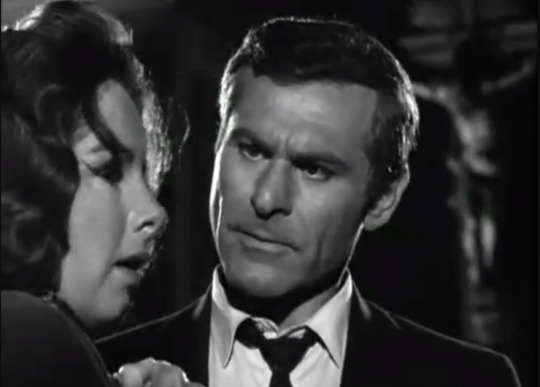
A Feasibility Study, The Outer Limits, 1964
I must’ve missed this episode when it aired, so I had the pleasure of seeing it for the first time this evening. I thought it was superb all round. I was especially impressed by the acting of Sam Wanamaker and Phyllis Love who portrayed the doctor and his wife. The setting of Any Neighborhood, USA with its eerie calm and apparent normalcy always adds potency to horror, because suburbia (in its idealized form) is so strongly associated with safety and routine. This aspect reminded me of the American author Shirley Jackson who is notable for using this weird juxtaposition in her stories. The resolutions of the crises, both marital and communal, are well orchestrated and moving.
0 notes
Text

A side benefit of a library is having places to hide your chocolate.
1 note
·
View note
Text
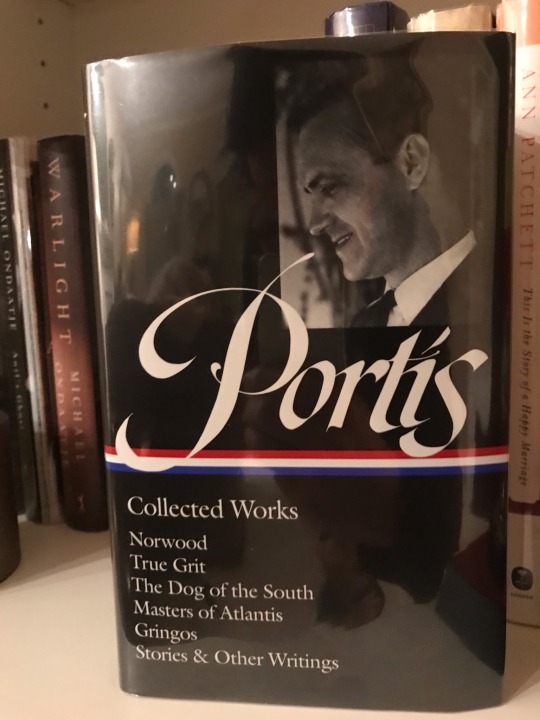
True Grit (1968) by Charles Portis. I thoroughly enjoyed True Grit, an American classic of the South. I preferred the quirkiness of Norwood, but I was partial to the images of the frontier and especially the colloquial speech of the SW as rendered by Charles Portis (born and raised in Arkansas). It’s outwardly hard bitten but has an ingenuous quality that I find endearing and often hilarious in its matter of frankness.
Country foods to try:
Sofky: thin mush or gruel made of corn meal.
Corn dodger: a small hard fried or baked cornmeal cake.
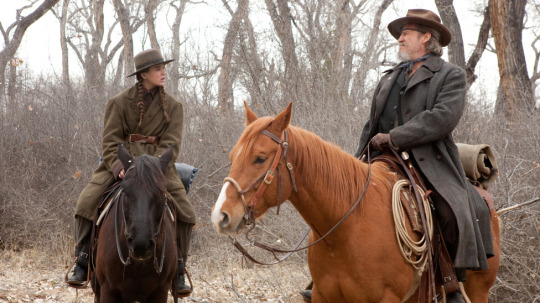
1 note
·
View note
Text
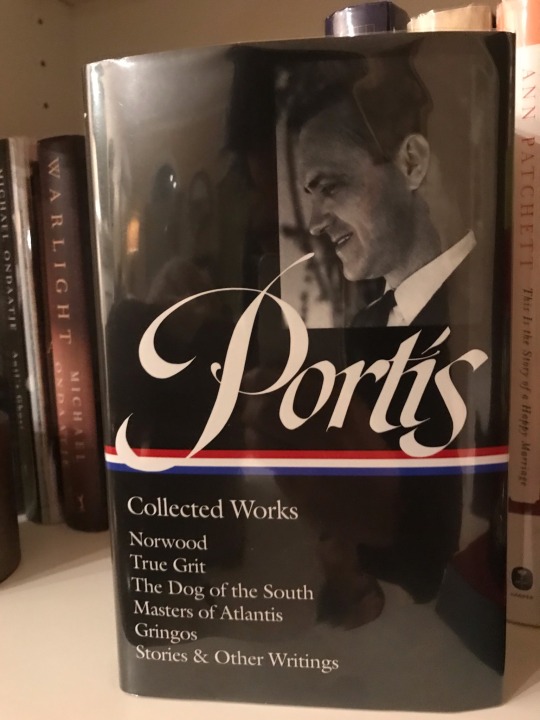
Norwood (1966) by Charles Portis. I savored the gritty, forlorn, Texarkana setting and the marginalized characters. His deadpan delivery (at times reminiscent of Raymond Chandler), ear for colloquial dialogue, and eye for irrelevant detail are brilliant and often hilarious. It will appeal to those with an appreciation for life’s stark realities and absurdities. Loved it.
Excerpts:
He calls the button that enables the seat on a bus to recline, the “Reclino-button”. 😆
“The Remleys had been picking asparagus in the Imperial Valley and were now on their way home with their asparagus money. Traveling with them was their infant son Herschel. Herschel was a cheerful, bright eyed little fellow. He was very well behaved and Norwood remarked on this. Mrs. Remley patted Herschel on his tummy and said, ‘Say I’m not always this nice’. Herschel grinned but said nothing. ‘I believe the cat has got that boy’s tongue,’ said Norwood. ‘Say no he ain’t,’ said Mrs. Remley. ‘Say I can talk plenty when I want to, Mr. Man.’ ‘Tell me how old you are.’ ‘Say I’m two years old.’ ‘Hold up this many fingers,’ said Norwood. ‘He don’t know about that,’ said Mrs. Remley, ‘But he can blow out a match.’ “
Tilmon snickered and shook hands with Norwood. There was a frosty glaze on top of his right sleeve where he had been wiping his nose.
‘Volume is his middle name. Isn’t that right, Tilmon? I say volume is your middle name.’ Tilmon said ‘Tee hee hee.’ His tongue fell out as if to receive a coin.
She was wearing a shiny green party dress with shoulder straps, and some open-toed shoes that were just at the point of exploding with toes. She glowered. She looked formidable.

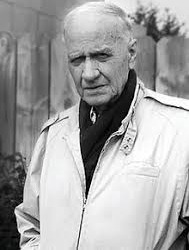
1 note
·
View note
Text
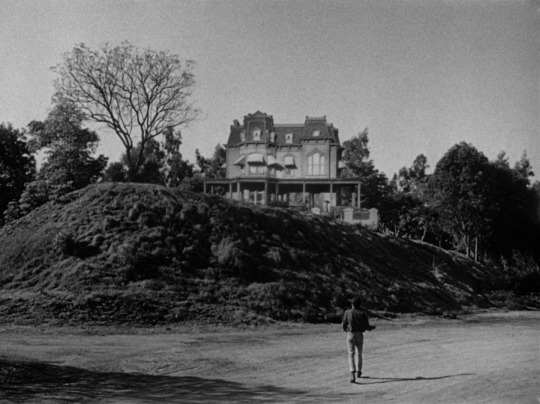
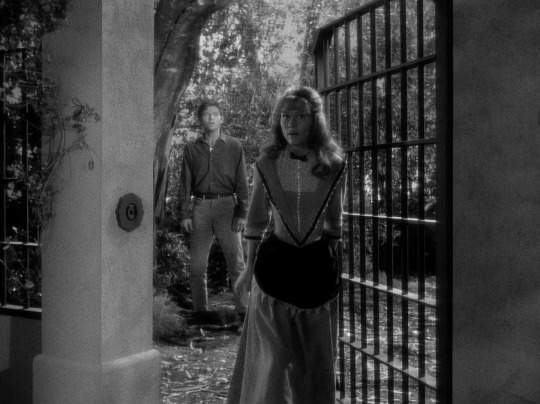
The Guests was one of my favorite Outer Limits episodes when I was a kid. I saw it for the first time since my childhood with my college age daughter today, and we were creeped out anew. We rented a house house like the one in the episode in the 60s. It was badly dilapidated, but you could see that it was once magnificent: the huge threadbare oriental rug in the drawing room, crystal fixtures, the grand central staircase. I loved playing in the spare upper story rooms packed with old furniture, the back servants’ stairs and garret rooms, the kitchen pantry rooms lined from floor to ceiling with empty bottles. At night we heard mice or rats scurrying in the attic. This was the house where I watched the OL for the first time on our black and white Philco set. My mother hated the decrepitude of the house and was fearful of the run down neighborhood, but living in that house was a boon to a child’s imagination.
1 note
·
View note
Text
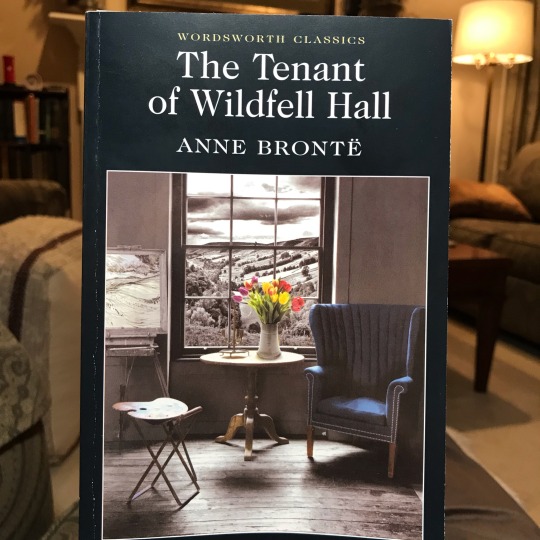
Reading The Tenant of Wildfell Hall by Anne Brontë, 1848.
So far I am impressed by Mrs. Graham’s independence, the strength of her convictions, and her willingness to defend her positions even at the expense of offending those with contrary views. As one would expect, such a woman is vexing to chauvinistic men and diffident women. On the other hand, despite her intelligence and her ability to see the shortsightedness of her friends’ matches, her premarital blindness to Arthur Huntingdon’s nature is surprising and disappointing. Sadly one’s judgement and intuition in youth often fail against physical attraction.
A difficult time appears predictable for Helen Graham, so I will pause at the halfway point and may resume some day.
Memorable excerpts:
I was wearied to death with small talk – nothing wears me out like that. I cannot imagine how they can go on as they do.… I hate talking, where there is no exchange of ideas or sentiments, and no good given or received.
1 note
·
View note
Text
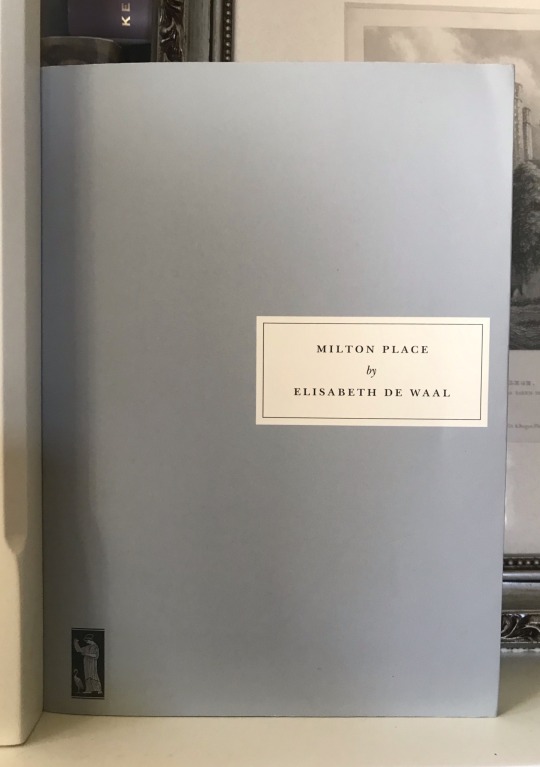
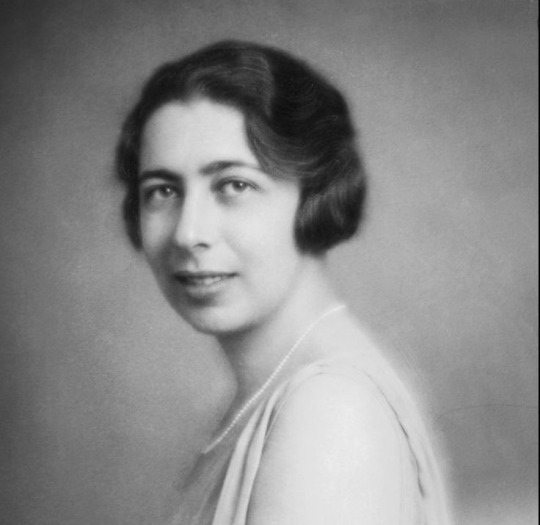
Milton Place by Vienna born Elisabeth De Waal. It was never published in her lifetime. Persephone Books published it in 2019.
The strength of the novel is the depiction of the life of the English gentry in the form of Mr. Barlow and the English country house. Her characters are generally well done, although we know very little about Mr. Barlow’s and Anita’s marriages.
There were a few major problems I had with the story: Firstly, Mr. Barlow never asks Anita Seiler about her mother, the object of his great infatuation when he was a young man. Secondly, I thought the love affair was highly improbable given the setting as a guest and the generational gap. Thirdly, Anita’s lack of embarrassment and remorse over the discovery of her affair was rather weird. Lastly, the author is too repetitive with the descriptions of place, and the narrative drive gets bogged down. 2/5
2 notes
·
View notes
Text
This is an informative and entertaining talk about “Five Women Writers Who Changed the World” by the award winning South African author and Fellow of the Royal Society of Literature and Fellow of St. Hilda’s College, Oxford, Lyndall Gordon. The five women writers are Mary Shelley, Emily Brontë, George Eliot, Olive Schreiner, and Virginia Woolf. Press the play button in the link to start the talk. You can see the talk in full screen mode directly from YouTube.
Near the end of the talk, Lyndall Gordon relates a wonderful proposition by Virginia Woolf’s Quaker aunt, Miss Stevens, for a third House of Parliament, a consultative body composed of women and elected by women who would eschew the traditional framework of adversarial government and would instead employ the tenets of preservation, nurture, sympathy, compromise, and listening.❤️
youtube
0 notes